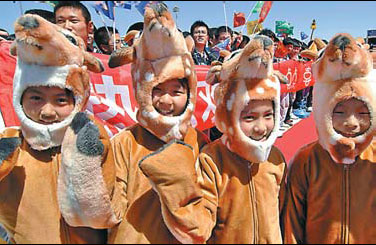|
 Children dressed up in costumes get ready to welcome a pair of spotted deer and two goats at the Weihai Airport. The animals were sent by Taiwan as gifts.
Zhu Zheng / Xinhua
Children dressed up in costumes get ready to welcome a pair of spotted deer and two goats at the Weihai Airport. The animals were sent by Taiwan as gifts.
Zhu Zheng / Xinhua
Four animals arrive in Shandong as part of goodwill exchange.
WEIHAI, Shandong - The arrival of a pair of rare deer and a pair of goats from Taiwan left the coastal city of Wehai in East China's Shandong province awash in smiles on Saturday.
The pair of deer, a 6-year-old male named Fan Xing and 3-year-old female Dian Dian came with the two goats, 6-year-old male Xiyangyang and 3-year-old Leyangyang, all native animals of Taiwan, arrived in an exchange for a pair of giant pandas the Chinese mainland offered Taiwan in 2008.
The rare deer and goats were greeted at Weihai International Airport at noon by hundreds of people waving banners and dozens of children dressed in deer and goat costumes.
"I am so excited. I want my mum to bring me to see the deer as soon as possible," Sun Yifei, an 8-year-old girl who came to welcome the animals at the airport with her painting of a pair of deer.
The animals were transferred to a nearby wharf, where a boat took them to their new home, Liugongdao National Forest Park on Liugongdao Island.
"I am very happy that Weihai is chosen to be the home for the deer and goats from Taiwan. My son will have a chance to see the differences between Taiwan deer and mainland deer," Zhang Xiaohang, a native of Liugongdao said at the welcoming ceremony.
Known as Taiwan serows, the goats are the only indigenous bovine animals at the island, while the sika deer are also a critically endangered species.
Liugongdao National Forest Park was selected to accommodate the animals in late 2009, thanks to its favorable climate and abundant food source. Currently, the island is home to some 200 wild deer.
For more than one year, experts from Liugongdao National Forest Park have been working closely with Taipei Zoo to develop proper living conditions for the animals.
The park built a 207-square-meter enclosure for the goats and a smaller shelter for the deer. Meanwhile, an area of 2,500 square meters of grass, shade, water and hillock will make the goats feel at home in the natural enclosure. The slightly larger deer habitat is 2,800 square meters.
Both shelters are equipped with advanced medical and heating facilities. Closed circuit cameras are also installed to oversee the animals.
Food is a main concern. Along with the deer and goats, about two weeks' worth of fresh leaves as well as half-a-year's supply of fodder was sent along by Taipei Zoo to help the animals adjust to life on the Chinese mainland, according to Shih Chih-chin, head of the Animal Group of Taipei Zoo.
"I hope the deer and goats get used to the island's life as soon as possible and give birth late this year or next year," Shih Chih-chin said.
A food production planting area at Liugongdao National Forest Park is dedicated to mulberry and elm trees. A total of 7,000 such trees will be planted to provide the animals with fresh leaves.
Wang Jiansong from the Liugongdao management committee said if everything goes well, the animals will go on exhibit in a month. Public access to the deer and goats will be through the two cameras installed in their enclosures, according to Wang.
By Zhao Ruixue (China Daily Shandong Bureau)
Editor: Chen Zhilin
|